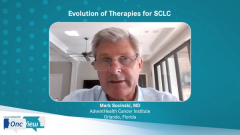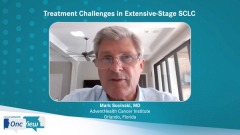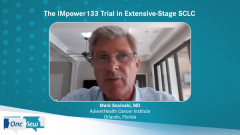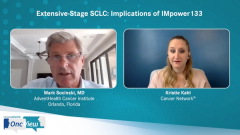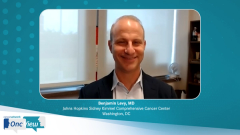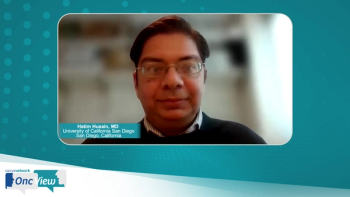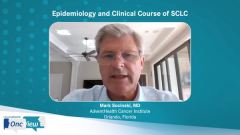
Immunotherapy for First-Line Extensive-Stage SCLC
A discussion regarding typical response rates to frontline therapy for extensive-stage small cell lung cancer and considerations for incorporating an immunotherapy agent into first-line treatment.
Episodes in this series

Kristie Kahl: Dr Levy, what have been the response rates, with standard-of-care frontline therapies, in patients with extensive-stage disease?
Benjamin Levy, MD: From what we know about platinum-etoposide, its ability to elicit responses in small cell lung cancer is meaningful. Unfortunately, it’s not durable. If platinum-etoposide is given to a patient with extensive-stage small cell lung cancer, response rates can be 70% to 80%. That’s meaningful. You can really make an impact on a patient with small cell lung cancer right away by giving them platinum-etoposide to elicit these high responses. Unfortunately, these responses, unlike others in non–small cell lung cancer, are not durable. We often get a response that lasts 2, 3, or 4 months and then growth starts to happen again. This happens for not all patients but for some. This is where there’s a need to add additional treatments to help not only responses but also sustain responses and keep the tumor in check.
Kristie Kahl: With that, what is the rationale for wanting to add immunotherapy in this setting?
Benjamin Levy, MD: There’s a lot of rationale. No. 1, we know that chemotherapy alone can promote antigen release to antigen-presenting cells. We know that chemotherapy might be a nice partner with immunotherapy, that this is a tumor that has a high tumor mutational burden and is heavily associated with smoking. These factors, we know, are a nice template to leverage immunotherapy. Smoking-related cancers, high tumor mutational burden, and adding it with chemotherapy—which may facilitate presentation of these tumor-specific antigens—are ripe for looking at potential synergy for adding on immunotherapy to chemotherapy.
Kristie Kahl: Which patients are eligible for immunotherapy in the frontline setting? Does PD-L1 status matter?
Benjamin Levy, MD: That’s a great question. Not all patients with extensive-stage lung cancer are going to be eligible. Most are for immunotherapy. The natural selection is in any tumor type. If a patient has autoimmune diseases that prohibit the patient from getting immunotherapy—for example, if a patient has an organ transplant—these are the rare things, but we do see patients who cannot get immunotherapy. Most patients can get immunotherapy with small cell lung cancer. Unlike non–small cell lung cancer, PD-L1 doesn’t really make a difference. We use the immunotherapy, in combination with chemotherapy, no matter what the PD-L1 is. You don’t need to wait for the PD-L1. It’s not like non–small cell lung cancer. You can go ahead once that diagnosis is made and move forward with treatment.
Kristie Kahl: Dr Levy, has the withdrawal of the pembrolizumab indication for metastatic small cell lung cancer affected treatment options for the extensive-stage disease?
Benjamin Levy, MD: I don’t think so. The pembrolizumab indication was in the second and third lines. Actually, I think it was in the third line. It did not make a difference. Now that immunotherapy has moved front line, having that immunotherapy beyond first line is really not needed. I don’t think it shifted anything in terms of treatment algorithms, what we’re doing with our patients, or expectations.
Kristie Kahl: What other immunotherapies have been used or tried in this population?
Benjamin Levy, MD: Two have a firm place in extensive-stage small cell lung cancer. One, of course, is atezolizumab, which we’ll talk about from the IMpower133; the other is durvalumab, from the CASPIAN study. There have been other strategies. A combination of nivolumab plus ipilimumab has been looked at in the refractory setting for pretreated patients who’ve progressed on a platinum doublet. That’s been looked at as well. You mentioned that single-agent nivolumab and pembrolizumab have been looked at in the second and third lines. Fortunately, we do have some traction in survival gains with the addition of immunotherapy with either atezolizumab or durvalumab in the front line with extensive-stage small cell lung cancer.
Transcript edited for clarity.
Newsletter
Stay up to date on recent advances in the multidisciplinary approach to cancer.


